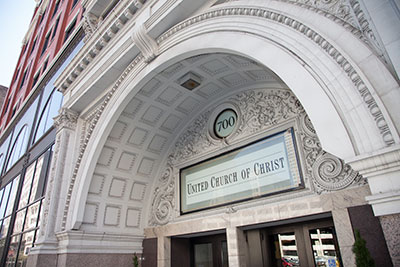Habakkuk Group makes progress toward new Manual on Ministry
 The Habakkuk Group, the group charged with not just revising the current Manual on Ministry, but re-visioning it, finished three days of intensive discussion at the United Church of Christ national offices, laying the foundation and clarifying the ways in which ministers are authorized to serve the church.
The Habakkuk Group, the group charged with not just revising the current Manual on Ministry, but re-visioning it, finished three days of intensive discussion at the United Church of Christ national offices, laying the foundation and clarifying the ways in which ministers are authorized to serve the church.
In the early stages of the process, the group is working diligently so that the final document empowers the various committees on ministry—the groups responsible in UCC associations and conferences for authorizing and reviewing UCC ministers—to carry out their responsibility effectively and efficiently as they seek out the next ministerial leaders of the UCC.
“We have unambiguously affirmed the importance of committees on ministry in our church system,” said Cameron Barr, co-chair of the Habakkuk Group, a working team of 17 lay people, specialized ministers, local church pastors and judicatory staff from across the wider UCC. “Committees on Ministry are essential covenant partners to ministers in every conceivable setting of our church. Therefore we are especially attentive to the needs of committees on ministry, to the challenges they face that are unique to this time, and to the expectations that the wider church has of them.”
The group, which gathered April 20-22 in Cleveland, is writing a new Manual on Ministry, with support from UCC national staff, based on what ministry is and is becoming, how ministers are formed and called, and what the procedures of ministerial authorization and oversight look like in the changing climate which is the 21st-century church.
The re-vision of the Manual on Ministry, expected as early as 2017, will one day guide the work of various committees across the UCC that gather in the conferences and associations of the denomination to authorize and oversee ministers.
“We have spent the past 10 months or so getting to know each other, building relationships and building trust,” Barr said. “We spent this meeting focused especially on the three forms of authorized ministry specified in the existing manual: ordained ministry, licensed ministry, and commissioned ministry.”
“Since our first meeting [in June 2014], we have paid sustained attention to the theology of authorized ministry,” Barr added. “We seek to ground our understanding of authorized ministry deeply in our theological, biblical, and historical traditions.”
The current Manual on Ministry, printed almost three decades ago in the mid-to-late 1980s, is simply out of date in some of its language and requires more than line-by-line updates, said the Rev. Rachel Hackenberg, UCC minister for committees on ministry.
“We’re not aiming to write [the Manual on Ministry] 2.0,” Hackenberg said. “The Habakkuk Group is tasked with envisioning a denominational document that speaks to our ecclesiastic processes for authorized ministry in a time of institutional change.”
The Habakkuk Group’s next meeting is scheduled for October 1-4 in Cleveland.
At General Synod 2015, Members of Committees on Ministry from across the UCC, as well as interested ministers and laypersons, will have a chance to meet and converse with the Habakkuk Group from 5 to 7 p.m. on June 26 at the Cleveland Convention Center, to learn and discuss the scope of their work.
“We will certainly have a presence at General Synod and we invite people to spend time with us,” Barr said. “It’s rare when so many people get together from across church and we want to take advantage of that opportunity.”
Related News
UCC celebrates Womxn’s History Month in March and beyond
Womxn's History Month is designated in March, and the United Church of Christ is celebrating....
Read MoreFive years later: How did the Covid-19 pandemic impact ministry?
On March 11, 2020, the World Health Organization officially declared Covid-19 a global...
Read MoreRev. Shari Prestemon nominated to serve as UCC’s Associate General Minister and Co-Executive, Global Ministries for Love of Neighbor Ministries
Re-entering the room at the March 2025 UCC Board Meeting in Cleveland to a standing ovation,...
Read More


